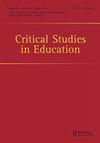The implicit epistemology of metric governance. New conceptions of motivational tensions in the corporate university
IF 2.7
2区 教育学
Q1 EDUCATION & EDUCATIONAL RESEARCH
引用次数: 4
Abstract
ABSTRACT This article aims to develop enhanced conceptions of the motivational drives that may be imperilled by their encounter with new forms of governance in higher education. Of particular concern are the motivational drives behind creative scientific pursuits associated with the humanities, and their vulnerability in the face of metrics governance and audit culture. I argue that the notion of the ‘motor’ of desire that underpins much social theories, including the Bourdieusian I draw on here, offers powerful accounts of the desires leveraged by metrics governance. However, they are less suitable for understanding the motivational drives that are curtailed in their encounter with the audit culture. I therefore suggest that an object-relational notion of the motor of the desire, a ‘desire for resonance’, could refine the Bourdieusian practice theory and yield enhanced conceptions of the motivational tensions in the corporate university. I suggest that these conflicts are not primarily concerning agents’ positions in the field and their relative acquisition of prestige and recognition, but rather conflicts among different modes of employing and directing human energies in the academic field and beyond.度量治理的隐含认识论。企业大学动机紧张的新概念
摘要本文旨在发展对动机驱动的强化概念,这些动机驱动可能会因在高等教育中遇到新的治理形式而受到威胁。特别令人担忧的是,与人文学科相关的创造性科学追求背后的动机,以及它们在指标治理和审计文化面前的脆弱性。我认为,支撑许多社会理论的欲望“马达”概念,包括我在这里引用的布迪厄学派,为衡量治理所利用的欲望提供了有力的解释。然而,他们不太适合理解在遇到审计文化时被削弱的动机。因此,我认为,欲望马达的客体关系概念,即“共鸣欲望”,可以完善布迪厄的实践理论,并产生对企业大学动机紧张关系的强化概念。我认为,这些冲突主要不是关于代理人在该领域的地位以及他们相对获得的声望和认可,而是在学术领域内外使用和引导人力的不同模式之间的冲突。
本文章由计算机程序翻译,如有差异,请以英文原文为准。
求助全文
约1分钟内获得全文
求助全文
来源期刊

Critical Studies in Education
EDUCATION & EDUCATIONAL RESEARCH-
CiteScore
10.10
自引率
5.10%
发文量
18
期刊介绍:
Critical Studies in Education is one of the few international journals devoted to a critical sociology of education, although it welcomes submissions with a critical stance that draw on other disciplines (e.g. philosophy, social geography, history) in order to understand ''the social''. Two interests frame the journal’s critical approach to research: (1) who benefits (and who does not) from current and historical social arrangements in education and, (2) from the standpoint of the least advantaged, what can be done about inequitable arrangements. Informed by this approach, articles published in the journal draw on post-structural, feminist, postcolonial and other critical orientations to critique education systems and to identify alternatives for education policy, practice and research.
 求助内容:
求助内容: 应助结果提醒方式:
应助结果提醒方式:


